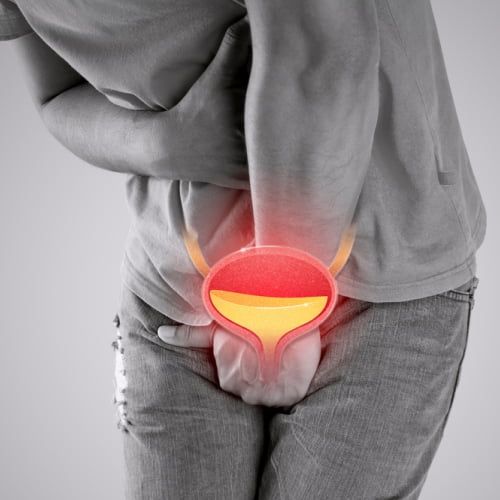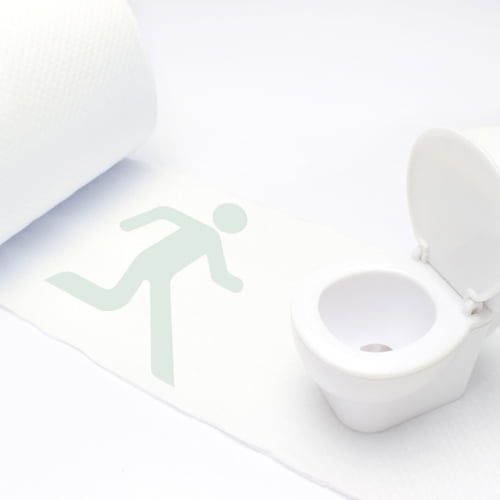The Interesting Link Between Sexual Activity and UTIs: What Everyone Needs to Know
By Brenda Peralta, Registered Dietician
Last Updated on June 9th, 2025 / Published on March 20, 2025

Urinary tract infections (UTIs) are very common. They are more common than you may think. If you’ve ever experienced a UTI, you know it’s an uncomfortable and painful experience. Most women have been there. So, you know what I’m talking about.
Research shows that UTIs happen to at least 50%–60%1 of women at least once in their lifetime.
You can get a UTI for various reasons — for example, the risk of getting one increases after sex. The problem is that not many women like to talk about it.
We want women to be able to connect with their bodies and understand that UTIs happen to almost everyone. Knowing about the condition and openly talking about it opens the door to preventing them and knowing what to do if it happens.
In this article, I’ll review the link between sexual activity and UTIs. I’ll discuss the myths about UTIs, facts you should know, and tips to help reduce the risk of them showing up.
What Are UTIs? A Quick Dive Into the Basics
As a women’s health specialist, I see many women coming to the clinic with UTIs. But what exactly is a UTI? Before I talk about the connection between sex and UTI, it’s important to define a UTI.
Urinary tract infections2 (UTI) happen when bacteria infect your urinary tract. It may happen when the bacteria from your skin, rectum, or urethra reach part of your urinary tract, which in most cases is the bladder (cystitis).
Even though both men and women can get UTIs, women are more likely to get a UTI since their urethras are shorter and closer to the rectum. This puts them at an increased risk of bacteria going up the urinary tract.
Some common causes of UTIs include:
- Sexual activity

- Changes in vaginal flora (menopause, lubricants, spermicides, and douches)

- Older adults and younger children are more likely to get a UTI

- Poor hygiene

- Pregnancy

- Diabetes

The symptoms you get depend on where the infection is located (kidneys or bladder). If you have a bladder infection, these are the most common symptoms:
- Pain or burning sensation while urinating

- Frequent urination

- Blood in the urine

- Feeling the need to urinate even though the bladder is empty

- Pressure in the lower abdomen

If you have a kidney infection, these are the most common symptoms:
- Chills
- Fever
- Lower back pain
- Nausea or vomiting
If you experience one of the symptoms listed above, talk to your doctor to determine the best course of action. But should you always go to a doctor for a UTI? How do you know when UTI is serious?
If the symptoms worsen or don’t go away after a couple of days, it’s best to consult a health professional. Leaving a UTI unattended3 can increase the risk of kidney damage, abscesses, and prostatitis.
The Link Between UTIs and Sexual Activity: Breaking Down Myths and Facts
There are many myths about UTIs. Since not many people talk about it (or don’t feel comfortable sharing), it’s easy to search the internet and get a lot of misinformation.
Here are some of the most common questions about UTIs.
Are UTIs Sexually Transmitted Diseases?
UTIs are not sexually transmitted diseases (STDs). While having sex may increase the risk of getting one, you don’t need to have sex to get one. Anything that increases the risk of bacteria reaching the urinary tract can cause a UTI.
Are UTIs Sexually Transmittable?
A UTI4 is also not a sexually transmitted infection (STI) or disease since they are not contagious. But you can pass the bacteria to your partner when having sex.
So, while it increases the risk of getting a UTI, having sex doesn’t immediately mean you are getting one.
How Does Sexual Activity Increase the Risk of UTIs?
A UTI happens when unwanted bacteria grow in the kidneys or bladder. When you have sex, it can push bacteria from the skin or the rectum into the urinary tract. Remember that all types of sex can increase the risk of UTI. Anal sex, oral sex, and penetrative sex can all increase bacterial overgrowth in the urinary tract.
Also, using a condom doesn’t mean reducing the risk of a UTI. While it can decrease the risk of catching an STD, bacteria can still reach the urinary tract. Also, spermicides may affect vaginal flora, increasing the risk of a UTI.
Can You Get a UTI Without Being Sexually Active?
What happens if you are not sexually active but still get a UTI? Can a woman get a UTI without being sexually active?
The short answer is yes, you can get a UTI without being sexually active.
But how? Anything that brings bacteria in contact with your urinary tract can increase the risk of a UTI.
Here are some non-sexual reasons you may get a UTI.
- High sugar diet. Eating more sugar makes your kidneys handle more sugar. This means more food for bacteria to thrive.

- Using diaphragms, tampons, and menstrual cups. Inserting things up your vagina without proper hygiene can increase the chances of bacteria getting to the urinary tract.

- Holding urine for too long.

- Pregnancy. Hormonal changes can affect the vaginal flora and can affect your bladder muscles.

- Dehydration. When there is no proper hydration, more bacteria can grow in the urinary tract.

Understanding How UTIs Develop
Most UTIs (80%5) happen due to an overgrowth of Escherichia Coli (E. coli). While this bacteria is common in the intestines, there are places where it shouldn’t be (such as the kidneys and bladder).
However, other bacteria, such as Staphylococcus saprophyticus (S. saprophyticus) and Proteus, may increase the risk of UTIs.
Normally, the body can handle the bacteria that enter the urinary tract. Yet, there may be times when the bacteria overgrow the body’s capacity to control them. As a result, it generates an infection.
Practical Tips: How to Reduce Your Risk of UTIs
Nobody wants to get a UTI, but let’s be real: eliminating sex is not an option.
Some things can reduce the risk of getting a UTI. But keep in mind that they are not foolproof. You may still get one even though you do everything right.
So, how to prevent UTI when sexually active?
- Urinate after sex (urinating before sex can also help)
- Take a shower with warm water after sex
- Use a barrier with anal sex
- Avoid douching
- Wash your hands before having sex
- Clean any sex toys you use thoroughly
- Wipe front to back (never the other way around)
- If you use a menstrual cup, clean it with hot water before placing it
- Use neutral soaps instead of scented ones
Frequently Asked Questions (FAQs)
How long does a UTI last?
For most people, a UTI should last no more than a week, maybe two of starting your treatment. If the symptoms worsen or they don’t go away, consult a doctor to determine if you should continue taking your medication.
Are some people more prone to UTIs?
Yes, women are more prone to UTIs than men due to their anatomy. Since the urinary tract is shorter and closer to the rectum in women, it increases the risk of bacterial overgrowth. However, men can still get a UTI.
Is it safe to be sexually active with a UTI?
Yes, it’s safe to be sexually active with a UTI, especially if you are a woman. However, it all depends on the symptoms you are having. Some women experience pain during sex when having a UTI. Also, sex increases the risk of more bacteria entering the urethra, which may affect recovery.
Takeaway
There is a link between UTIs and sexual activity. When having sex, it can increase the risk of bacteria entering the urinary tract, especially for women since the urinary tract is shorter and closer to the rectum.
However, while sex increases the risk of a UTI, it’s not the only reason. Other lifestyle choices (such as high sugar consumption) and poor hygiene can also increase the risk of a UTI.
If you experience any of the symptoms discussed above, talk to your doctor. Also, remember that your body is not something you should be ashamed of. Openly speaking about certain health conditions can decrease the risk of them happening or help you understand how to manage them.
Urinary tract infections (UTIs) are very common. They are more common than you may think. If you’ve ever experienced a UTI, you know it’s an uncomfortable and painful experience. Most women have been there. So, you know what I’m talking about.
Research shows that UTIs happen to at least 50%–60%1 of women at least once in their lifetime.
You can get a UTI for various reasons — for example, the risk of getting one increases after sex. The problem is that not many women like to talk about it.
We want women to be able to connect with their bodies and understand that UTIs happen to almost everyone. Knowing about the condition and openly talking about it opens the door to preventing them and knowing what to do if it happens.
Sources
- Behzadi, Payam, et al. “Urinary Tract Infections (UTIs) or Genital Tract Infections (GTIs)? It’s the Diagnostics That Count.” GMS Hygiene and Infection Control, vol. 14, Feb. 2019, https://doi.org/10.3205/dgkh000320.
- Centers for Disease Control and Prevention. “Suffering from a Urinary Tract Infection?” Centers for Disease Control and Prevention, 14 Jan. 2022, www.cdc.gov/antibiotic-use/uti.html#:~:text=UTIs%20are%20common%20infections%20that.
- Lee, Dong Sup, et al. “Community-Acquired Urinary Tract Infection by Escherichia Coli in the Era of Antibiotic Resistance.” BioMed Research International, vol. 2018, no. 2018, Sept. 2018, pp. 1–14, https://doi.org/10.1155/2018/7656752.
- Medina, Martha, and Edgardo Castillo-Pino. “An Introduction to the Epidemiology and Burden of Urinary Tract Infections.” Therapeutic Advances in Urology, vol. 11, no. 1, Jan. 2019, p. 175628721983217, https://doi.org/10.1177/1756287219832172.
- Sabih, Ayan, and Stephen W. Leslie. “Complicated Urinary Tract Infections.” National Library of Medicine, StatPearls Publishing, 5 Mar. 2019, www.ncbi.nlm.nih.gov/books/NBK436013/.



